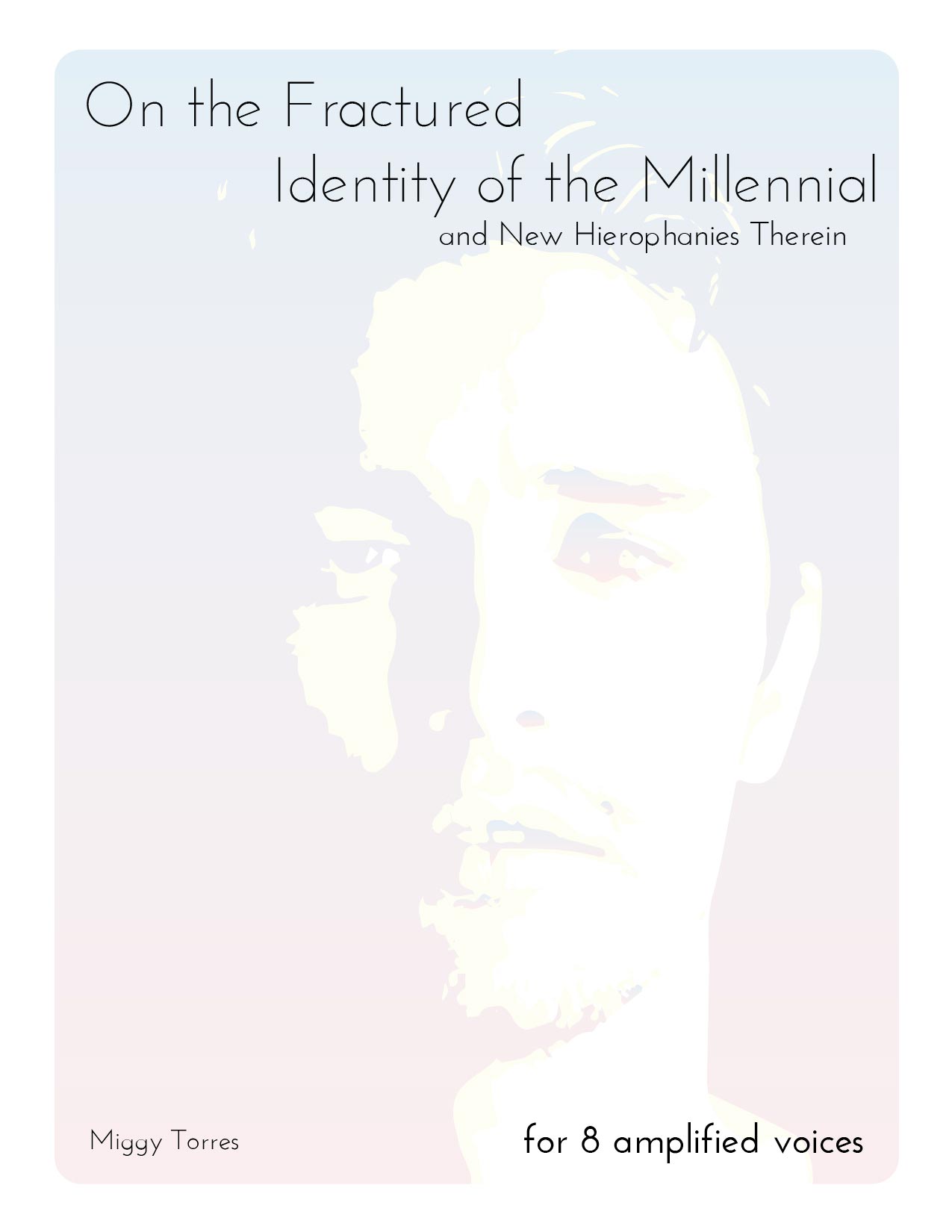

Composer's Note
On the Fractured Identity of the Millennial (And New Hierophanies Therein) is an exploration of the social and economic damages inflicted on the Millennial generation as a result of the broken promises of 80s and 90s Capitalism.
The work paints a portrait of a generation trapped in its adolescence, searching for its own identity, having been exploited by promises of a future that never came. This loss of identity and subsequent imprisonment in a state of adolescence is represented through the deification, degradation, and eventual destruction of the mythological identity of James Franco.
James Franco’s body of work constantly interrogates themes of adolescence and self-identity. In 2001, Franco starred as the title character in the biographical television film James Dean, an icon of the teenage disenchantment of a previous generation. In 2010, Franco published Palo Alto Stories, a collection of short stories recounting gritty experiences of teenagers set in his home town. In the same year, Franco produced a short film Masculinity and Me exploring gender identity. The film was shown as part of a mixed media exhibition entitled The Dangerous Book Four Boys, again an exploration of adolescence. From 2009 to 2012 James Franco, already a well established in Hollywood, portrayed a character known simply as “Franco” on the soap opera General Hospital—a caricature of himself.
Beyond the works he produces, however, Franco’s career itself can be viewed as a piece of performance art, glorifying adolescence and the search for personal identity. This is made especially clear by his pursuit of six graduate degrees (many of which were completed concurrently) in various artistic fields such as poetry, fiction writing, and digital media. By embodying the messy imperfections of adolescence—the striving through intense hard work to transform himself into something greater than what he was as a child—Franco personifies the search for personal identity that accompanies adolescence.
In a sense, the mythological Franco has fulfilled the promises of 80s and 90s Capitalism, becoming an icon of Millennialism. He has become “anything he wants to be,” devoting his life to the creation of art. A closer look, however, reveals a more disturbing truth: Franco’s relentless pursuit of graduate arts degrees is facilitated by his celebrity status. It is that very celebrity status that has inhibited him from developing his identity through genuine relationships with others, keeping him from knowing who he really is and cyclically fueling his relentless search for self. The irony of the myth of James Franco is that his apparent fulfillment of the Millennial Promise has actually trapped Franco in a state of eternal adolescence where he’s constantly trying to prove himself, constructing and reconstructing his identity by getting more and more degrees, creating more and more artwork, portraying more and more characters including hollow versions of himself, etc. Moreover, rather than overcoming the exploitative forces of 80s and 90s Capitalism, Franco has become an agent of those forces, using his empty mythological identity to sell Gucci to the Millennial generation.
After the turn of the millennium, a generation brought up to believe they could be anything they wanted to be—imbued with glorious idealism—began to wake up, finally opening their eyes to historically high levels of youth unemployment following the Great Recession. The promises of utopic future, having once seemed possible, exist now only on worn out VHS tapes. Millennials who want, like Franco, to devote their lives to the creation of art or the pursuit of a trade have been forced away from their dreams, crushed by the cost of education and pulverizing student loan debt. This dissonance between who they wanted to be and who they can afford to be has left many Millennials with a fractured identity, trapped—like Franco—in a state of eternal adolescence. Indeed, it has been observed that Millennials are putting off traditional rites of passage such as owning a home, getting married, or having children for primarily economic reasons, leading some sociologists to dub Millennials “The Peter Pan Generation.”
In the wake of the shattering of the Millennial Promise, several brands emerged from the Great Recession with a new promise, enticing Millennials to reconstruct their splintered identities by cultivating artificial relationships with products. Just as James Franco’s celebrity status and the commoditization of his identity inhibits him from generating a sense of personal identity, Millennials’ empty relationships with brands further obstruct them from generating a genuine sense of self.
Beyond developing these artificial relationships with brands, Millennials Sisyphistically continue the search for their own identities upon media where identities are artificially constructed (Facebook, Instagram, etc.). On the Fractured Identity of the Millennial not only casts into stark relief the absurdity of the perpetual search by Millennials for their own identities upon platforms where identities are artificially manufactured, but it also asks the question: without that search, would these social media even exist? The question then becomes one of Qui abigit auriga—a chicken and egg problem. Do these social media platforms fuel a futile search for selfness or do they emerge as a byproduct of animals scouring in the dark for photographs to call mirrors?
Despite being trapped in this socioeconomic killing jar, certain studies and surveys have shown Millennials to be the most civic-minded, progressive, and compassionate generation on record. On the Fractured Identity of the Millennial ends with a complete breakdown of James Franco’s mythological identity and an allusion to the hope that the very idealism imbued in Millennials for the sake of their exploitation will be the same idealism with which we overcome that exploitation and make the world a better place, though perhaps at great cost.
Cheers.





